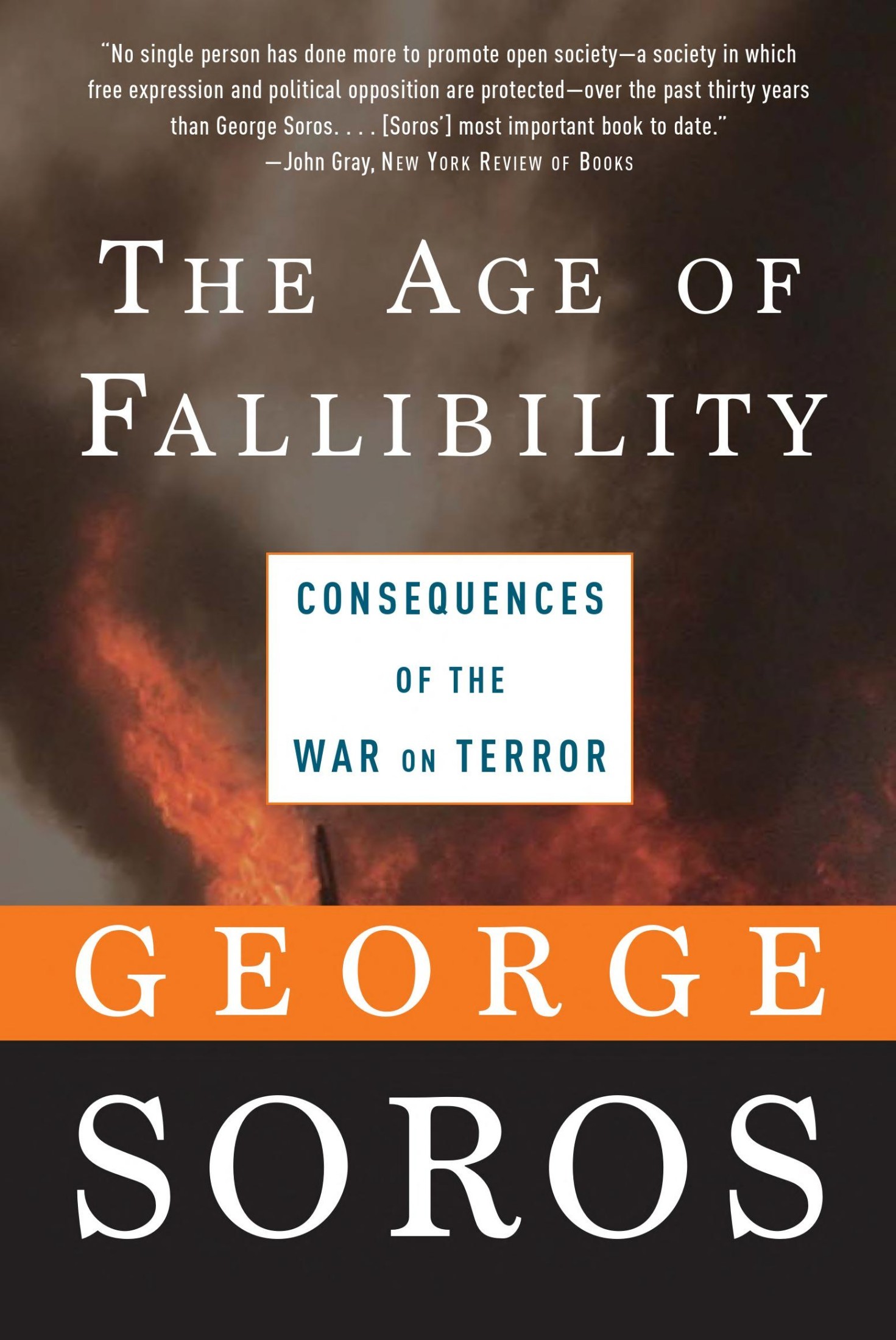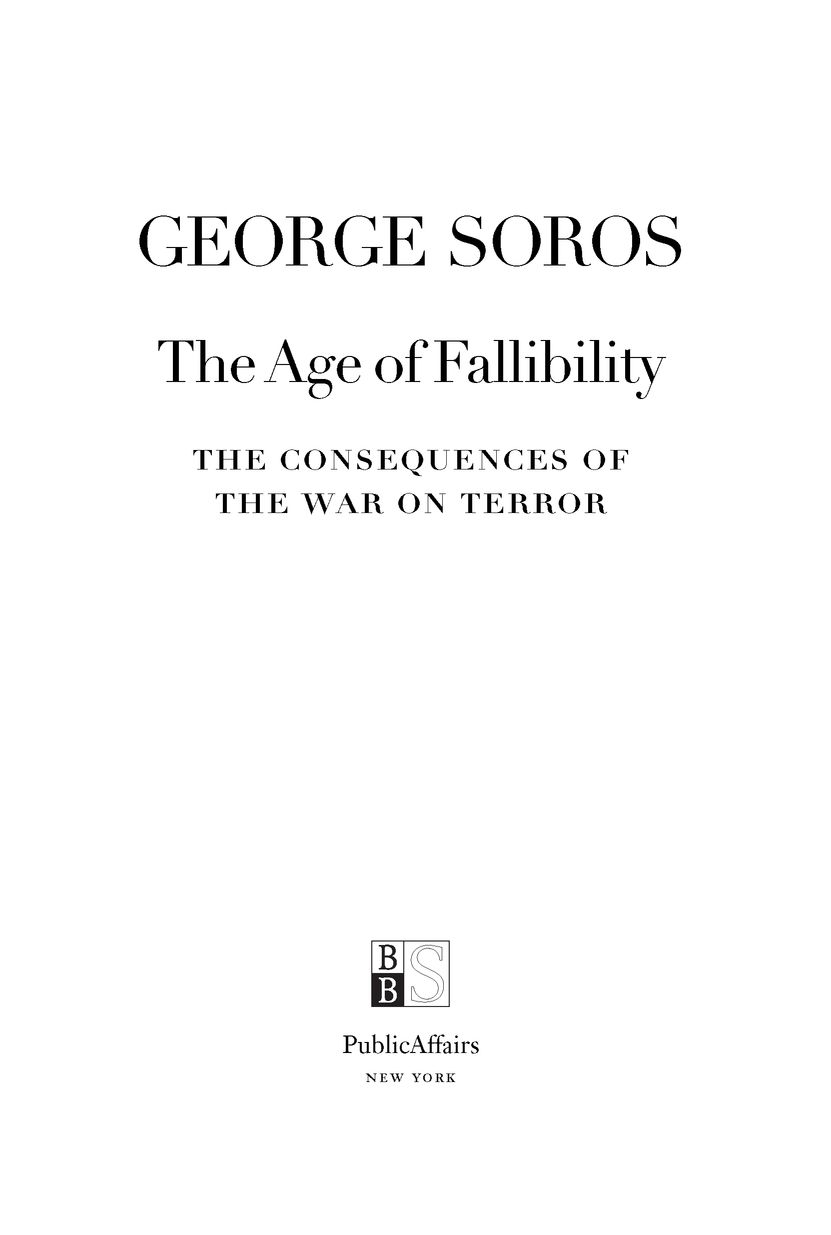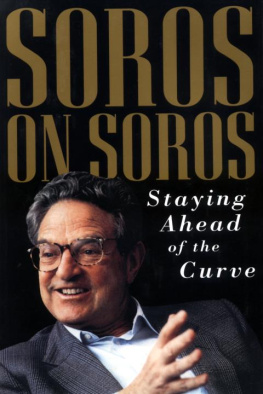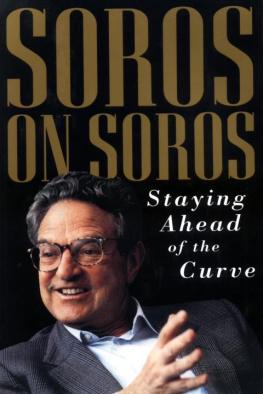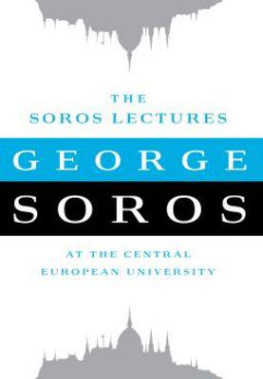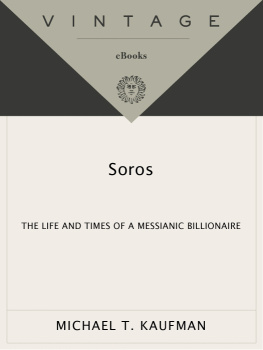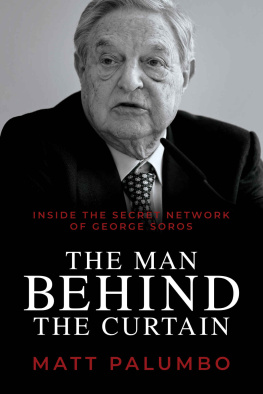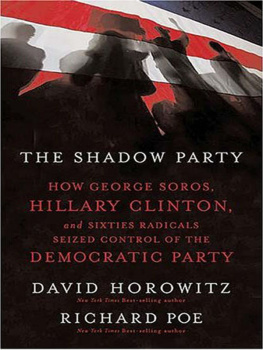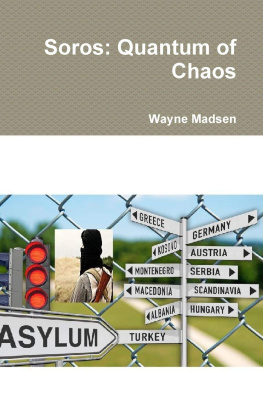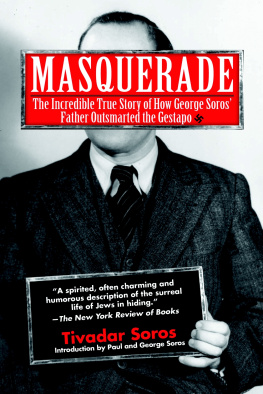Table of Contents
ALSO BY GEORGE SOROS
The Bubble of American Supremacy: The Cost of Bushs War in Iraq
George Soros on Globalization
Open Society: Reforming Global Capitalism
The Crisis of Global Capitalism: Open Society Endangered
Soros on Soros: Staying Ahead of the Curve
Underwriting Democracy
Opening the Soviet System
The Alchemy of Finance: Reading the Mind of the Market
Acknowledgments
I would not have been able to write this book without the help of my Personal Assistant, Yvonne Sheer. Michael Vachon has done a lot more than what you would expect from a Director of Communications. Other members of my staff including Douglas York, Dan Lustig, Wylia Sims, and Edward Sypniewski were also helpful in various ways.
I received valuable comments from a number of people whom I list in alphabetical order: Hakan Altinay, Zoe Baird, Kurt Biedenkopf , Emma Bonino, Robert Boorstin, Rosa Brooks, Maria Cattaui, Steven Clemons, Joan Dunlop, Yehuda Elkana, Sylvie Erb, Gareth Evans, Joseph Firestone, Roman Frydman, Misha Glenny, Karen Gordon, John Gray, Lani Guinier, Morton Halperin, Joost Hiltermann, Mary Kaldor, Anatole Kaletsky, Robert Kushen, Terje Larsen, Charles Leykum, Karin Lissakers, Mark Malloch Brown, Anthony Marx, William Maynes, Pierre Mirabaud, Kalman Mizsei, Ethan Nadelmann, Aryeh Neier, Howard Newman, Kalypso Nicolaidas, Wiktor Osiatynski, Christopher Patten, Istvan Rev, Anthony Richter, Jack Rosenthal, Thomas Scanlon, Laura Silber, John Simon, Robert Skidelsky, F. van Zyl Slabbert, Aleksander Smolar, Jonathan Soros, Mark Steitz, Herb Sturz, Strobe Talbott, Stuart Umpleby, Mabel van Oranje, Byron Wien, and Andre Wilkens.
I benefited from a discussion at the Central European University in Budapest with the following participants: Aziz Al-Azmeh, Sorin Antohi, Andri Chassambouli, Yehuda Elkana, Katalin Farkas, Eva Fodor, Janos Kis, Liviu Matei, Daniel Monterescu, Prem Kumar Rajaram, Howard Robinson, and Carsten Schneider; and an informal seminar in my home with Leon Botstein, Rosa Brooks, Troy Duster, Hendrik Hertzberg, Harold Koh, Gara LaMarche, Deborah Leff, Nicholas Lemann, Aryeh Neier, Peter Osnos, John Podesta, Simon Rosenberg, Mark Schmitt, Jennifer Soros, Jonathan Soros, and Michael Vachon.
PublicAffairs, and particularly its founder, Peter Osnos, excelled as usual.
April 2006
GEORGE SOROS
Prologue
Many people dream about making the world a better place, but I have been fortunate in being able to fulfill my dreams more than most. That said, my influence has been greatly exaggerated. I was labeled the man who broke the Bank of England when the United Kingdom was forced to leave the European Exchange Rate Mechanism. Mohamed Mahatir, the former prime minister of Malaysia, accused me of causing the Asian financial crisis of 1997. President Vladimir Putin of Russia holds me responsible for the so-called color revolutions in Georgia and Ukraine. And I was accused of trying to buy the election after I took a stand against the reelection of President George W. Bush in 2004. All these claims are overstated, or unfounded. For instance, I did not trade in Asian currencies for several months prior to the Asain crisis so I could not have caused it. But the fact remains that I did play a role in some of these events, and many others. My foundations were active in the countries that formed part of the Soviet empire and supported the forces striving to turn those countries into open societies. They provided some cushion for culture, education, and science when the monolith of the communist state collapsed. They helped educate a new, self-conscious Roma (gypsy) elite in Eastern Europe. The Decade of Roma Inclusion, which brought together nine governments, the European Union and the World Bank in a concerted effort to improve the lot of the Roma, was my idea. During the Balkan wars of the nineties, my foundation, staffed by brave people, did what it could to ease the horror that befell Sarajevo. I have also been a moving force behind the Publish What You Pay campaign and the Extractive Industries Transparency Initiative. Rightly or wrongly, I have come to think that I can have an influence on the course of events, that I can have a policy.
How did I reach this privileged position? That is a long story and I have already told it in bits and pieces. To sum it up, I believe I combine three qualifications. First, I have developed a conceptual framework that has given me a certain understanding of history, and, in particular, what I call far-from-equilibrium situations; second, I have a set of firm ethical and political beliefs; and third, I have made a lot of money. Many people have one or two of these attributes, but the combination of all three is unusual. In addition, the network of nonprofit foundations I have established provides me with a firm base of local knowledge on the basis of which I can claim the right to be heard on a variety of issues. And the people who run these foundations have a right to participate in the political life of their country, a right that I, as an outsider, may not have.
In the early days, I was a loner. When the Soviet system collapsed, my foundations could accomplish a lot on their own; but when I tried to cooperate with other institutions or governments, I met with little success. Events moved too fast for people to keep up with them. For a long time my foundations were practically the only game in town, and that made them very influential; but when I proposed various policy initiatives, my suggestions usually fell on deaf ears. Since then, the situation has practically reversed. My ability to accomplish things on my own has greatly diminished, partly because I am taking on bigger issues and partly because I am not the only player on the field. On the other hand, I have acquired considerable convening power. I can help move issues forward by taking the initiative, or simply by participating. This allows me to form policy and take a stand on issues better than in the early days.
I should like to clarify where I stand. My goal is to make the world a better place. There is nothing unusual about that. Many people share my aspiration and work at it more selflessly than I do. What sets me apart is that I am able to do it on a larger scale than most others. When he was prime minister of Macedonia, Branko Crvenkovski, once described me as a stateless statesman. States have interests but no principles, he said. You have principles but no interests. I like that formulation and I try to live up to it. The world is badly in need of stateless statesmen.
Our society is suspicious of those who claim to be virtuous and not without justification. Many rich people who form foundations have ulterior motives for doing so. I like to believe I am different. Being able to do the right thing is a rare privilege, and exercising that privilege is ample reward. But I always tell people who question my motives that they are right to do so. When I claim to be disinterested, the burden of proof is on me.
As a stateless statesman, I face a number of obstacles. First, I am not really disinterested. I have to confess that I have a desire to make an impact and it gives me satisfaction to be involved in historical events. Second, I do not have perfect knowledge. I am bound to be wrong. I made my fortune in financial markets by understanding this and correcting my mistakes. In the area of world affairs, being wrong has more lasting consequences. Third, I recognize that no one has elected me or appointed me as a guardian of the public interest; I have taken on that role for myself. People are rightly suspicious of someone who can have a policy but is not accountable to the public. Nevertheless, I believe the common interests of humanity badly need looking after and it is better to do it imperfectly than not to try at all. One of my heroes, Sergei Kovalyov, once said to me, All my life, I have been fighting for losing causes. He was a former Soviet dissident who then became ombudsman in the Russian Duma and played an important role in settling the first war in Chechnya. I try to follow in his footsteps. In the financial markets, I take positions in order to win. In the social sphere, I take positions because I believe in them whether I succeed or not. That is the difference between financial markets which are not governed by moral considerations and the social sphere where morality ought to play a role.

